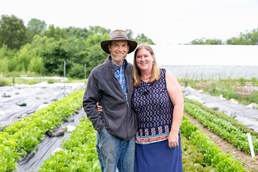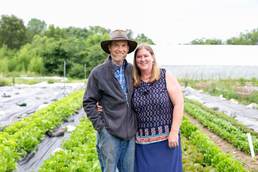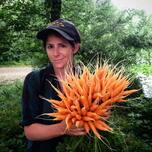NCR-SARE farmer forum |
Friday Schedule |
|
9:00 - 9:40 am
Modeling Efficiency and Safety in a Vegetable Wash and Pack House | Recording On Millsap Farm we realized a few years ago that the bulk of our time is spent in the packshed, and so we set out to improve our efficiency, comfort, and effectiveness in this space. We'll look at several easy to adopt innovations we use in our pack shed which have saved us hundreds of hours a year. We'll take a look at the cost/benefit of several simple tools. James "Curtis" Millsap, Milsap Farms 6593 North Emu Lane Springfield, MO 65803 millsapfarms@gmail.com 4178390847 www.millsapfarms.com |

Curtis and Sarah Millsap, along with their ten children, farm manager, apprentices, and occasional volunteers, have been operating Millsap Farms, a 20-acre farm in Springfield MO, for the past 13 years. They grow 2 acres of vegetables and flowers, with 25,000 s.f. (about ½ acre) under greenhouses, high tunnels, and caterpillar tunnels. They use organic practices, and sell through a year-round 200 member CSA, farmers' market, and restaurants. They sow, transplant, harvest, and sell, 50 weeks out of the year. The Millsaps also host a weekly pizza night from May to October, where they have 250 people out to the farm for wood fired pizza and live music.
|
|
9:45 - 10:30 am
Exploration and Demonstration of Low Pressure Steam for Disease and Weed Control on a Small Scale Vegetable Farm | Recording Steam heat treatment was once a common practice for greenhouse growers, to reduce weed and disease pressure in these high value areas. The increased use of chemical fumigants and herbicides brought this era to an end, but for organic growers, it's making a comeback. We'll look closely at our equipment, practices, and results, including chickweed and sclerotinia control in the winter greenhouse. James "Curtis" Millsap, Milsap Farms 6593 North Emu Lane Springfield, MO 65803 millsapfarms@gmail.com 4178390847 www.millsapfarms.com |

Curtis and Sarah Millsap, along with their ten children, farm manager, apprentices, and occasional volunteers, have been operating Millsap Farms, a 20-acre farm in Springfield MO, for the past 13 years. They grow 2 acres of vegetables and flowers, with 25,000 s.f. (about ½ acre) under greenhouses, high tunnels, and caterpillar tunnels. They use organic practices, and sell through a year-round 200 member CSA, farmers' market, and restaurants. They sow, transplant, harvest, and sell, 50 weeks out of the year. The Millsaps also host a weekly pizza night from May to October, where they have 250 people out to the farm for wood fired pizza and live music.
|
|
10:45 - 11:25 am
Mesotunnels: Exploring a New Approach for Organic Cucurbits | Recording Organic management of cucurbit crops in the Midwest is hindered by bacterial wilt, cucurbit yellow vine disease, and the insects that carry the pathogens: cucumber beetles and squash bugs. Mesotunnels - larger than low tunnels, smaller than high tunnels - can protect plants all season. Field trials in IA and are aimed at optimizing pollination and weed control on muskmelon in mesotunnel systems. Mark Gleason, Iowa State University 2213 Pammel Drive Ames, IA 50011 mgleason@iastate.edu (515) 294-0579 |

Mark Gleason is a 35-year faculty member in plant pathology at Iowa State University. His research, teaching, and extension career has focused on sustainable management of diseases of fruit and vegetable crops.
|
|
11:30 - 12:15 pm
Midwest Summer Greens Production - The Effect of Shade on Yield and Quality | Recording This presentation will explore production methods using shade tunnels for fresh salad greens in a challenging climate – the hot, humid summers of the Midwest U.S. These are high value crops with local demand that is steadily increasing. Enhancing capacity to supply lettuce and other greens during the height of summer improves economic viability and contributes to a robust local food system. Emily Wright, Three Creeks Farm + Forest 14220 S. Wren School Road Ashland, MO 65010 emily.wright.mo@gmail.com (212) 810-7285 threecreeksmo.com |

Emily grew up in rural Missouri and now owns and operates Three Creeks Farm + Forest with her partner, Paul Weber. Three Creeks is a diversified farm, growing and harvesting a wide variety of vegetables, herbs, flowers and wild edibles in the Missouri River Hills of Boone County. Prior to starting Three Creeks, Emily worked on farms and ranches in Italy, Mexico, and across the United States - for both production and research. Emily holds a B.A. in Environmental Science from Colorado College and a Masters in Environmental Management from the Yale School of the Environment, specializing in sustainable land use.
|

